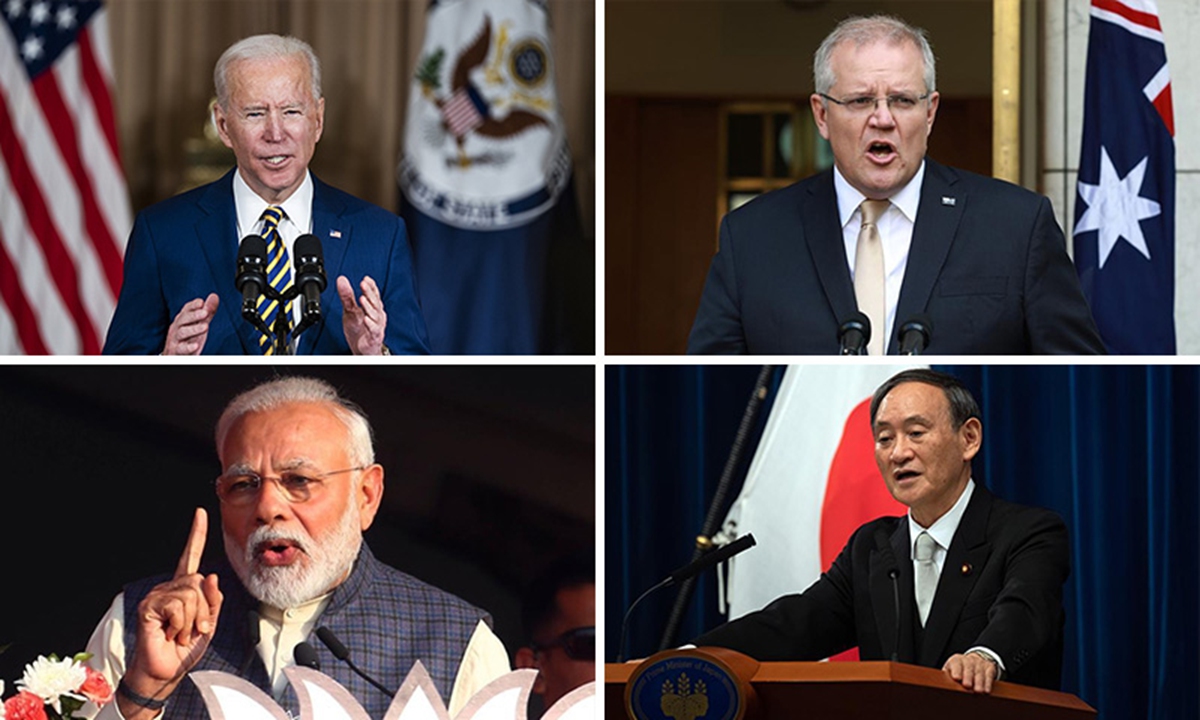Quad’s scope too limited to kill `Asian Century'
Quad’s scope too limited to kill 'Asian Century'

Photo: GT
In an article titled "Quad summit may kill visions of `Asian Century'", Dhanajay Tripathi, a scholar at South Asia University, argues that the Quad Summit is the first concrete step in killing the dream of the "Asian Century", a vision about a united Asia dominating world politics and culture in the 21st century. This is actually an exaggeration of the Quad's influence. The Quad will have an impact on Asian affairs, but after all, there are only four countries in the Quad. Asia is a very vast continent with many countries, so these four countries will not be able to influence the future development trend of Asia.Besides, the Quad countries themselves are not always on the same page: each has its own interests and different policy preferences. The Quad is now mainly focused on cooperation in the security field, but even in the security field, the four countries in fact have a lot of different interests. India, for example, has always had a very close relationship with Russia, which is considered a security threat by the US. India is also not a US ally, unlike Japan and Australia. And over the years, India's suspicions or misgivings about US strategy have always been very strong.
All four Quad countries have their calculations, and if there is still no certainty on whether they can fully cooperate, then how will they be able to affect, change or "kill" Asian unity and cooperation between Asian countries?
What's more, although there are some conflicting views on security issues in the past few years, such as China-India border frictions and the Diaoyu Islands dispute between China and Japan, China and the countries involved are strengthening their interactions in these areas, such as economy and trade, science and technology, as well as humanities. China is still the largest trading partner of Australia, Japan and India, and one of the most important trading partners of the US. So, as the Quad focuses on security, it certainly does not want to compromise cooperation and interaction in other areas.
For the same reason, Asian countries other than Japan and India are also unlikely to stand with the Quad, or to be fully aligned with the four countries. Asian countries will respond to the Quad's involvement in Asian affairs based on their own interests. Although it is difficult to make a consensus on taking concrete action among all Asian countries, most parts of Asia right now share three same goals at least.
First, the vast majority of Asian countries are developing countries, and for them, the first basic demand is to have a peaceful and stable region. Even a small military conflict will cause a strong, negative so-called spillover effect, which no country wants to see. On the other hand, Asian countries want economic prosperity. Asia's desire for economic growth has become more urgent facing the economic recession caused by the COVID-19 pandemic, which is another area that all countries want to cooperate in. All of these are areas that China can make great contributions in.
As a matter of fact, most countries around the world are not worried about the rise of China, and most Asian countries do not see a so-called Chinese threat at all. Most countries see China's economic development, social stability, as well as achievements in COVID-19 epidemic prevention and control instead, and won't fully accept the narratives of the US. For them, China represents more an opportunity than a threat. Most countries are rational, and they do not want to choose sides between China and the US, or be involved in a potential conflict between China and the US, just as Premier Lee Hsien Loong of Singapore recently pointed out on March 14, 2021.
India and Japan, which have participated in the Quad, may lose some development opportunities because of their promotion of the Quad being bound to raise concerns from China. The Quad focuses on security and military cooperation, and is well known to be aimed at China. That being said, China won't sit idly by without implementing countermeasures, which will for sure affect bilateral ties between China and the Quad members.
Furthermore, multilateral cooperation on the regional or international level will also be affected by a poor relationship between China and these Quad countries. Issues, including economic policy coordination, joint response to climate change, the Iranian nuclear issue and so on, require transnational cooperation, especially between major powers. If these issues cannot be handled properly, then no country can remain without damage.
The author is deputy director of the Center for American Studies at Fudan University. opinion@globaltimes.com.cn


